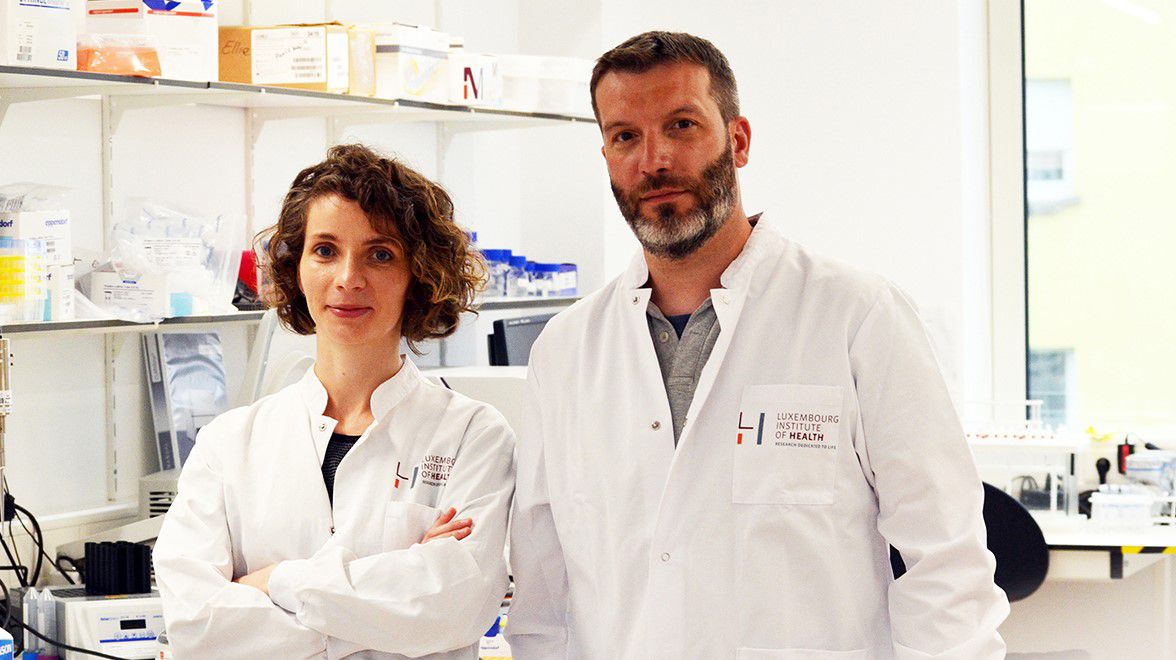8 December 2020
4 min read
[Press release] Luxembourg researchers receive prestigious international award
2019 Galien Prize in Pharmacology awarded to Luxembourg Institute of Health (LIH) scientists
Dr Andy Chevigné and Dr Martyna Szpakowska from the LIH Department of Infection and Immunity (DII) were rewarded for their outstanding contribution to molecular pharmacology during a virtual ceremony on Tuesday, December 8th, in the presence of Frank Vandenbroucke, Belgian Minister of Public Health and Social Affairs, and of representatives of pharmaceutical companies and healthcare hubs. The Galien Prize is traditionally organised in Belgium and Luxembourg by Roularta HealthCare on a yearly basis and crowns the most significant discoveries in the fields of pharmacology, drug development and medical devices.
The two LIH researchers were commended during an online ceremony for their continuous achievements in advancing the understanding of the relevance, role, function and pharmacology of atypical chemokine receptors (ACKRs) and their ligands. ACKRs are “molecular switches” that interact with small molecules known as chemokines, thereby regulating cellular mechanisms such as cell growth and survival and consequently influencing a variety of physiological and pathological processes, including immune responses and immunosurveillance. Due to their involvement in several inflammatory and autoimmune diseases, as well as in many cancers, ACKRs have recently emerged as highly promising potential drug targets, although their biology is currently insufficiently understood.
The 2019 Galien Prize in Pharmacology is a recognition of Dr Chevigné’s and Dr Szpakowska’s efforts over the last eight years to extend their research activities and establish the first molecular pharmacology academic laboratory in Luxembourg. The research laboratory of “Immuno-Pharmacology and Interactomics” is located at the LIH Department of Infection and Immunity and co-supervised by the two laureates. The main objectives of their research group are to investigate the roles of chemokines and their receptors in immune disorders, cancer, viral infections and neuro-inflammatory diseases, ultimately leading to the development of drugs targeting these molecular components.
As part of the award ceremony, Dr Chevigné presented his team’s work to the expert audience through the presentation “Understanding the molecular pharmacology of human atypical chemokine receptors”.
“We are humbled and grateful to the jury for this unique opportunity. The Galien Prize is the highest accolade for pharmaceutical research and development and competition was indeed very strong. I am therefore extremely proud of the work we have been able to accomplish so far. This achievement will give additional visibility and credibility to the research performed at LIH and in Luxembourg in general”
states Dr Chevigné, Principal Investigator and Group Leader of the Immuno-Pharmacology and Interactomics group.
“Receiving the prize has been even more gratifying considering that it has been awarded to Luxembourgish researchers for the first time in 38 years! This is a further confirmation of the excellent international reputation of our institute and of the Grand Duchy as a whole”, adds Dr Martyna Szpakowska.
“Our goal is to perform research that can be translated into concrete applications with tangible benefits for patients. The award of the Prix Galien to our scientists is a confirmation of the success of our efforts in this direction”, states Prof Markus Ollert, Director of the LIH Department of Infection and Immunity. “I also take the opportunity to extend my heartfelt gratitude to the organisers of this initiative, as well as to the Luxembourg National Research Fund, the Ministry of Higher Education and Research and the charitable initiative ‘Télévie’ for the generous and unwavering support”, he concludes.
Organised yearly by Roularta HealthCare, editor of the “Journal du Médecin/Artsenkrant”, the Galien Prize in Pharmacology consists of a gold medal and a sum of EUR 5,000. It is granted to a scientist or group of scientists under the age of 40 performing clinical or fundamental pharmacology research within a Belgian or Luxembourgish academic institute.

Dr Martyna Szpakowska and Dr Andy Chevigné

2019 Prix Galien
About the Galien Prize
About the Luxembourg Institute of Health: Research dedicated to life
The Luxembourg Institute of Health (LIH) is a public research organization at the forefront of biomedical sciences. With its strong expertise in population health, oncology, infection and immunity as well as storage and handling of biological samples, its research activities impact on people’s health. At LIH, devoted scientists investigate disease mechanisms to develop new diagnostics, innovative therapies and effective tools to implement personalized medicine.
About the Department of Infection and Immunity
LIH’s Department of Infection and Immunity is a basic clinical-translational research entity aiming at understanding the complex mechanisms of infectious and inflammatory disease processes to enable new ways to diagnose, prevent and cure human diseases. Building on a highly interdisciplinary research environment, the research strategy of the Department of Infection and Immunity focuses on experimental discovery and validation, bridging to clinical application and technology development to address major unsolved medical needs in the areas of immune-mediated inflammation (such as in allergy, asthma, autoimmunity), cancer and infectious diseases (COVID-19, AIDS, measles and rubella virus infection, amongst others).
